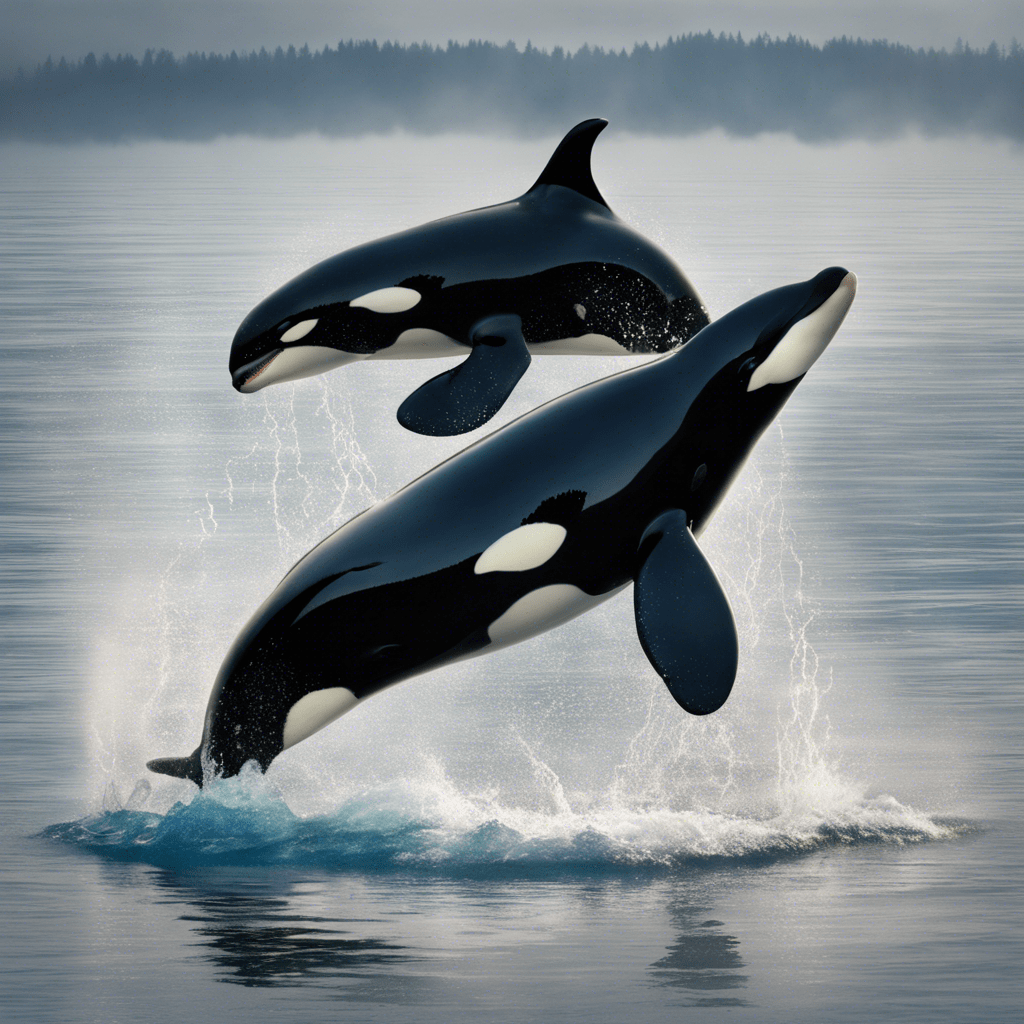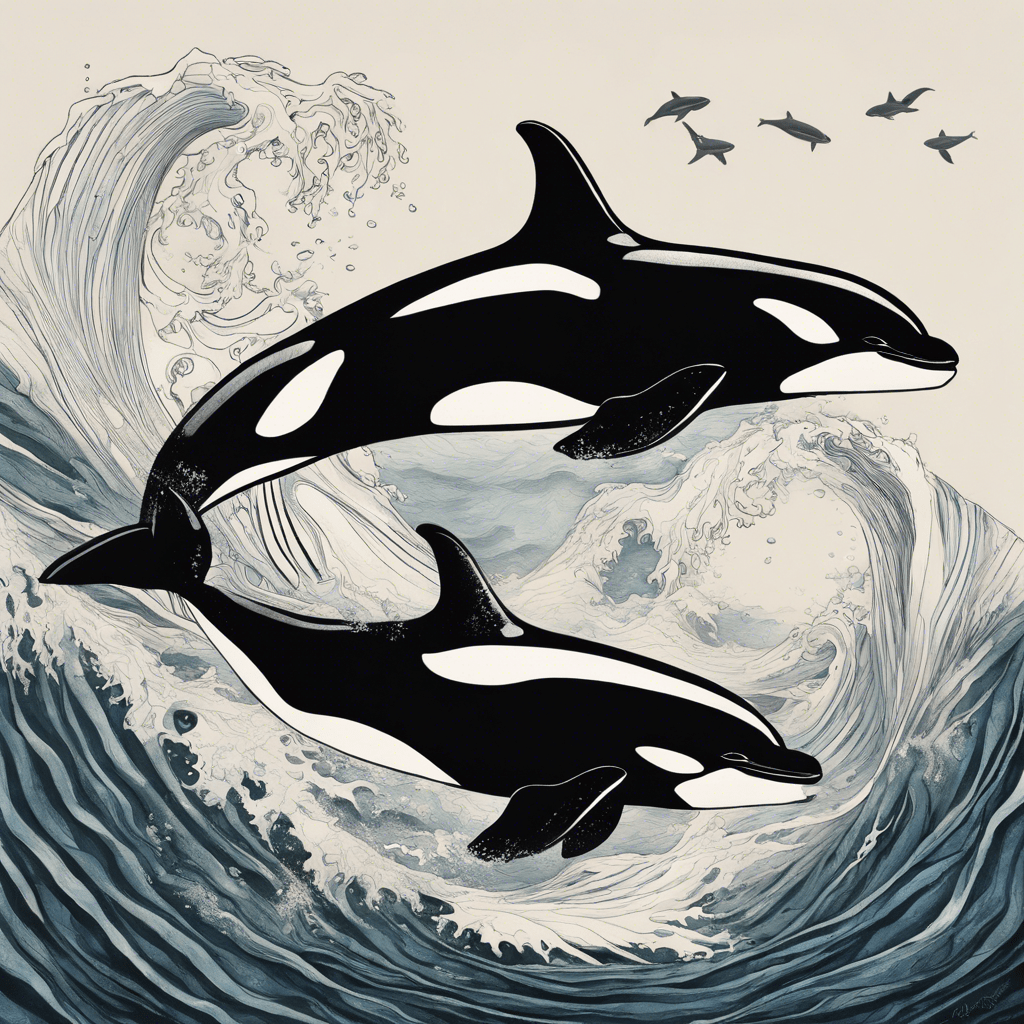Orcas: Noble Guardians of the Sea and Symbols of Strength
Orcas, also known as killer whales, are truly remarkable creatures that have captured the imagination of people worldwide. These majestic beings command respect and admiration, serving as emblems of strength, intelligence, and harmony with nature.
Noble Guardians of the Sea
Orcas are the ocean’s apex predators, sitting at the top of the marine food chain. They play a vital role in maintaining healthy ecosystems by regulating prey populations.
By keeping these populations in balance, orcas prevent any one species from becoming too abundant, thus preserving the delicate equilibrium of the ocean environment.
Furthermore, orcas contribute to maintaining biodiversity within their ecosystems. Controlling prey species creates an environment where diverse marine life can flourish, fostering a resilient and thriving ocean.

Orcas exhibit remarkable intelligence and possess complex social structures. They live in close-knit family groups led by experienced females, fostering cooperation in hunting, raising offspring, and navigating vast distances across the ocean.
Their sophisticated communication system involves a repertoire of clicks, whistles, and calls, allowing them to coordinate hunts, share information about food sources, and maintain strong social bonds within their pods.
Additionally, orcas are skilled problem-solvers, employing various hunting techniques tailored to different prey.
They have been observed working together to beach whales and dolphins, showcasing their strategic planning abilities and effective communication.
Culture and Mythology
Orcas hold a revered place in many cultures and mythologies around the world, particularly among indigenous tribes of the Pacific Northwest, such as the Haida, Tlingit, and Kwakwaka’wakw.
For these communities, orcas are seen as protectors of the sea, spiritual guides, and kinship figures that bridge the gap between the physical and spiritual realms.
According to Haida mythology, orcas can transform into human form and walk the land, making them revered as ancestors and supernatural beings.
| Culture/Tribe | Significance |
|---|---|
| Haida | Orcas can transform into human form, revered as ancestors and supernatural beings |
| Tlingit | Protectors of the sea, spiritual guides |
| Kwakwaka’wakw | Kinship figures bridging the physical and spiritual worlds |
Orcas are often depicted in totem poles, legends, and rituals, symbolizing profound respect for the natural forces they represent. Many indigenous cultures view orcas as embodiments of strength, power, and a deep connection to the spirit world.
In some belief systems, orcas are perceived as guardians of the sea, protecting humans from dangers lurking in the depths. They might be viewed as guides for safe passage or benevolent spirits ensuring the well-being of coastal communities.
The cultural and mythological significance of orcas highlights the enduring human fascination with these remarkable creatures.
From symbols of family and strength to guardians of the deep, orcas continue to inspire our imagination and stories, reminding us of our profound connection to the natural world.
Spiritual Significance
From a spiritual perspective, orcas hold deep symbolic meaning. They represent power, intelligence, social bonds, and emotional depth.

Encountering an orca, whether in real life or in dreams, is often viewed as a powerful omen, suggesting guidance, protection, and profound insights into personal and communal relationships.
In shamanic traditions, orcas are revered as totem animals – spiritual allies whose presence and guidance can help navigate significant life transitions and personal quests.
Their association with water ties them to the subconscious and emotional realms, inviting individuals to explore their depths, embrace change, and tap into their inner strength.
Across various cultures, orcas are seen as bridges or messengers between the human world and the spirit realm. Their appearance might be interpreted as a spiritual message or a reminder to connect with your intuition.
Symbolism and Interpretations
- Connection to the Spirit World: Orcas are believed to bridge the gap between the human and spirit realms, acting as messengers or guides.
- Wisdom and Knowledge: Their intelligence and complex social structures associate orcas with wisdom and ancient knowledge.
- Transformation and Change: Orcas’ ability to navigate between the surface and depths symbolizes the potential for significant personal growth and embracing new beginnings.
- Protection and Guidance: In some cultures, orcas are revered as protectors, offering safe passage or spiritual guardianship.
- Harmony and Balance: As apex predators maintain ecosystem balance, orcas signify the importance of harmony and respecting the natural order.
Modern-day Symbolism
In contemporary contexts, orcas continue to symbolize freedom, unity, and ecological awareness.
As ambassadors of the marine ecosystem, they remind us of the importance of preserving the delicate balance of our oceans.
The orca’s plight in captivity has raised global awareness about conservation efforts, making them powerful symbols for animal rights and environmental advocacy.
| Symbol | Representation |
|---|---|
| Freedom | Orcas’ majestic presence in the open ocean |
| Unity | Their close-knit social structures and family bonds |
| Ecological Awareness | Their vital role in maintaining healthy marine ecosystems |
Orcas are also emblematic of the beauty and mystery of nature, inspiring awe and a sense of wonder.
Their presence in popular media, art, and storytelling furthers their symbolic reach, crossing cultural boundaries and resonating with diverse audiences.
Conclusion
The symbolism surrounding orcas is truly rich and diverse, drawing from ancient traditions and contemporary understandings. These magnificent creatures represent strength, intelligence, and social harmony while embodying spiritual wisdom and ecological consciousness.
Whether revered as guardians of the sea or celebrated as emblems of freedom and unity, orcas continue to inspire and challenge us to protect the natural world and honor its profound connections.
As we conclude this exploration, take a moment to reflect on the incredible symbolism and significance of these remarkable creatures. May their presence in our oceans continue to captivate our hearts and minds, as a reminder of the beauty and wonder surrounding us.
FAQ
Unveiling the Symbolism of Orcas
Dreams involving orcas can have various interpretations:
► Deep Emotions: Orcas, connected to the ocean’s depths, might symbolize hidden emotions or subconscious desires surfacing.
► Guidance and Transformation: They could represent a powerful guide or a prompt for significant change or self-discovery.
► Inner Strength and Power: Encountering an orca might symbolize your own inner strength, intuition, or untapped potential.
What is the spiritual energy of the orca?
The orca’s spiritual energy is often associated with:
► Wisdom and Knowledge: Their intelligence and connection to the ocean depths might symbolize access to ancient knowledge or hidden truths.
► Protection and Guidance: In some cultures, they are seen as spiritual guardians, offering protection and guidance on life’s journey.
► Transformation and Growth: Their ability to navigate between surface and depths symbolizes the potential for significant personal transformation.
► Harmony and Balance: Their role in maintaining a balanced ocean ecosystem translates to a call for balance and harmony in your own life.
Are killer whales nice or mean?
The term “killer whale” refers to their hunting prowess, not inherent malice. Orcas are generally not aggressive towards humans, and their complex social behaviors indicate a high level of intelligence.
What is the orca in Japanese mythology?
In Japanese mythology, orcas are associated with:
► Longevity and Good Luck: They are seen as symbols of a long and prosperous life.
► Marital Bliss: They are sometimes depicted as a harmonious couple, representing happy marriages.
Does orca mean bringer of death?
Not necessarily. The association with death might stem from their role as apex predators, but in many cultures, they are seen as protectors or guardians, not harbingers of doom.







